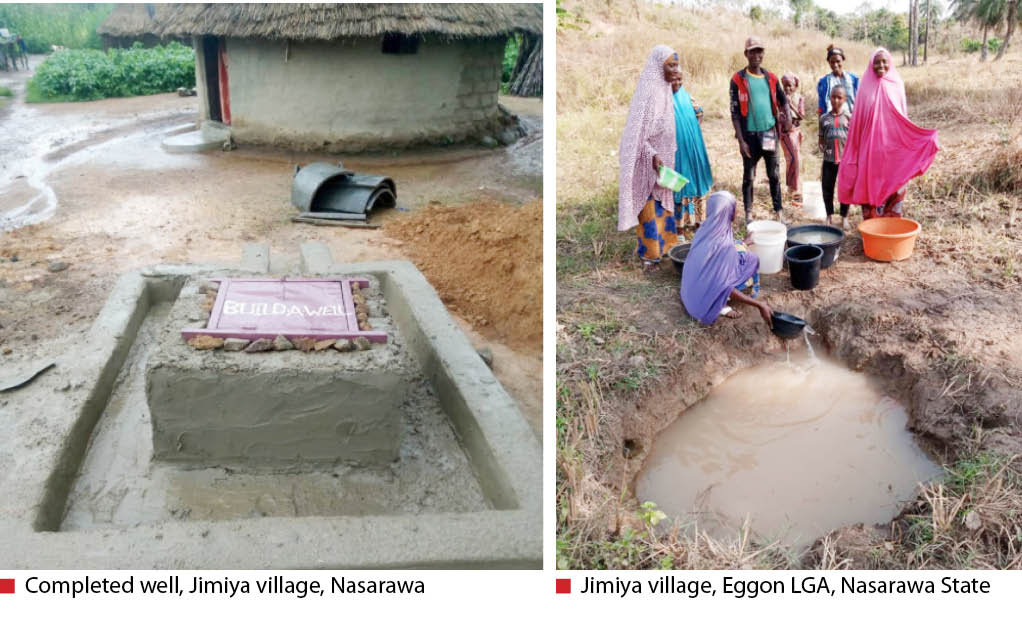Despite the inclusion of access to potable water on Sustainable Development Goals and efforts of the Nigerian government, several Nigerian communities still rely on unsafe sources of water. But a non-governmental organisation is working on changing the narratives as it moves to provide potable water to communities in northern Nigeria that are adversely affected by lack of potable water, Daily Trust Saturday reports.
Misbahu el-Hamza
On March 21, 2022, the United Nations International Children’s Emergency Fund (UNICEF) released a report commemorating World Water Day, which is observed on March 22 every year. Over 86 per cent of Nigerians, or 176 million people, lack access to a supply of securely managed drinking water. The report has painted a grim picture of Nigeria’s catastrophic clean, drinkable water shortage and its immediate impacts. This problem is particularly critical in northern Nigeria, where just 30 per cent of the population has access to potable water.
Jigawa flood victims still hopeful of govt’s intervention 2 weeks after
How UAE visa restriction put Nigerian travellers on edge
Providing access to a good drinking water source
Water The Needy Foundation (WTNF), a non-governmental organization, is devoted to putting a smile on the faces of Nigerians by providing access to potable, inexpensive drinking water in rural and remote communities around the country. The effort to help communities access at least a traditional well so that women and girls do not have to trek a long distance to collect water began in 2017. WTNF founder Muhammad Mustapha, a 35-year-old businessman, started crowdfunding using his Twitter account.
In the initial stage, Muhammad recalled, there was no intention of forming a foundation. But the need arose when he noticed how committed donors were to funding each project he tweeted. “We started with a personal bank account to collect donations, but eventually, we had to register the foundation because many donations were coming in, and we wanted to ensure transparency and accountability.”
He formed a team of four people and officially registered the foundation in September 2019. From 2017 to date, WTNF has completed over 600 projects across 19 northern states, including the Federal Capital Territory, and Osun and Ogun States in the southwest.
Each project is carried out based on requests from community members through the foundation’s social media accounts or by recommendations. The foundation offers three types of interventions: traditional wells, manually operated, and solar-powered boreholes. There’s no preference for what to construct in a community. However, the foundation is not employing a one-size-fits-all approach to beneficiary communities. Instead, it uses a multi-dimensional analysis approach to factor in local situations and direct efforts to the community’s needs.
“The type of project we carry out in a community depends on the nature of the community,” Muhammad explained. “For villages, we prefer to construct a traditional well, mainly because of maintenance.”

On average, a traditional well costs them N110,000, N600,000-N950,000 for manual pump boreholes, and N2.5 million for solar boreholes, as they frequently tell sponsors before the recent hike in naira-dollar exchange. The road access and groundwater level also affect project costs. WTNF has completed 16 electric/solar boreholes across five states—FCT, Kano, Katsina, Sokoto, and Zamfara.
Communities taking ownership
After completing a project, WTNF hands it over to the locals while leaving their contact information and painting the names of the sponsors who requested it.
Lawan Musa, 53, is the chairman of the Tafasa Community Forum, Kura Local Government Area of Kano State. He said a team from the WTNF came in February 2020 to inform them of their intent and scout for a suitable location to build a solar borehole. Tafasa was recommended for the borehole by WTNF’s national project supervisor, Engr. Abubakar Mahmud, who also doubled as local supervisor in Kano State. He said it took them less than a week to complete the construction.
“When I saw the water pumped out, my happiness was unquantifiable. I felt like someone had paid for my pilgrimage to Mecca. It’s the peak of happiness one can have in this world.”
After commissioning the project, the community members set up a 5-man committee to manage it. But then there was a problem. Residents must wait for the sun to rise for the solar to be powered and pump water. If people finish the 1,500-litre tank, they must wait an hour or two to pump it again.
A few months later, Lawan phoned to ask Engr. Abubakar if they could be allowed to convert the solar into an electric borehole. The supervisor said, “It is no longer WTNF’s property; it’s your own. You can do as you please if you wouldn’t damage it or refuse the general public the opportunity to collect water free of charge.”
The committee planned and tasked eight houses interested in channeling water into their homes with N10,000 each to fund the conversion. Within 2 weeks, they were able to buy a second-hand 4.5K volt amp generator to pump the water. They also replaced the donated 1.5 HP submersible water pump with a 3.5 HP. They built a 9-square-meter generator house, which also served as a control station for the borehole. The borehole now pumps more water within a short time and serves over 500 homes and neighbouring communities in Tafasa at no cost.
Halima Ahmad, a mother of three young girls in Tafasa, said she spent about N4,000 a month buying water before the borehole. And if she did not have money, two of her daughters had to trek two kilometers to fetch water. “Our kids hated being told to go and fetch water because of the distance,” she said. “This made them miss school.” But now, children even crave being asked to fetch water from the new borehole. The conversion of the solar into an electric borehole by the Tafasa community was a well-thought-out plan. It improved the capacity of the borehole and reduced waiting time. Nonetheless, Lawan stated that they intend to replace the donated 1,500-litre tank with a larger one.
The activities of WTNF aren’t going unnoticed. Many foundations reached out to members of the foundation, seeking advice on how they could replicate the intervention in their respective states. “First, it’s all about transparency and accountability,” noted Amina Sha’aban, the foundation’s secretary. “Once people send you money and you can’t account for it, there’s a problem.”
“When we identify a community in need, we post it online to seek donations. Upon securing a sponsor, we then go to the community and introduce the project to the head of the community, from whom we’ll get a location and have our experts determine the presence of water. We then assign a local supervisor who’ll report to us so we can send updates to all donors.”
According to Amina, being sincere and accountable is the only way to do away with any mistrust from sponsors.
And the strategy appears to be working. They no longer have to post on social media asking for donations to complete a project. They have surplus donations and standby sponsors waiting to pay for the next project, “especially the traditional well,” according to Muhammad.
Maintenance is a significant issue for most NGOs in Nigeria. “You build a borehole, and you’ll see that within six months, it stops working because the people aren’t taking care of it,” laments Abubakar. “We leave behind our phone numbers in every community, but still, some will fail to reach out.”
Therefore, to ensure the long-term viability of its projects, WTNF established a functional system for returning to beneficiary communities for stakeholder management and engagement to ensure that all projects are operational. They carry out monitoring and evaluation supervision during the rainy season. “The rainy season is when we stop building wells and boreholes, as it’s not advisable to do that because you wouldn’t have the real water level,” Muhammad explained.
WTNF needs to expand its reach because they still get many requests from other communities almost daily. And there’s obviously a need for others to champion similar interventions so that 26.5 million Nigerian children don’t have to experience high or extreme water vulnerability.
Insecurity in some parts of the country is a significant hurdle for the WTNF. Muhammad said that recently, they’ve been unable to reach out to Zamfara despite huge demand from various communities in the state. “We’re all afraid. I wouldn’t want to risk the security of my workers because these bandits wouldn’t care whether they’re workers or not.”
This story has been made possible through collaboration with the Nigeria Health Watch with support from the Solutions Journalism Network.

 Join Daily Trust WhatsApp Community For Quick Access To News and Happenings Around You.
Join Daily Trust WhatsApp Community For Quick Access To News and Happenings Around You.


